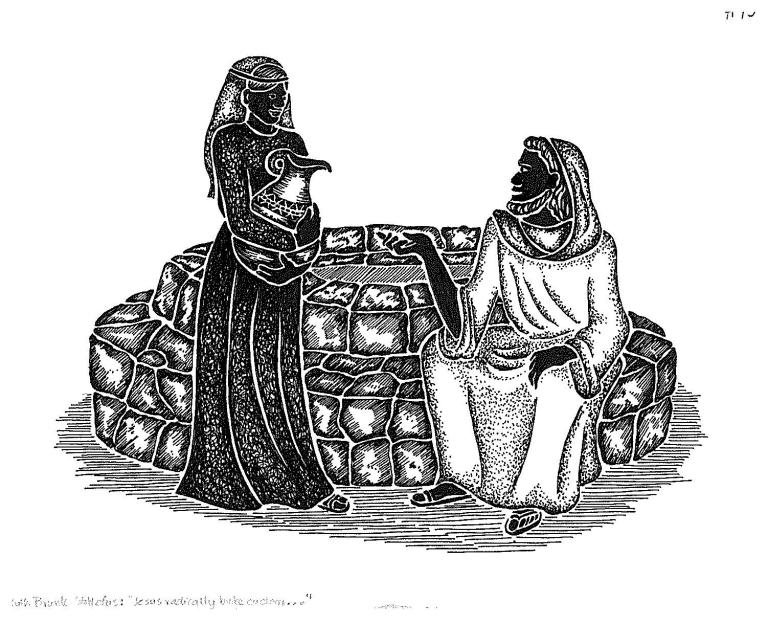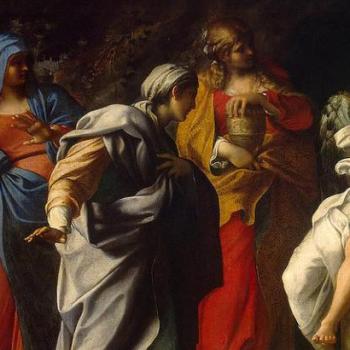The Samaritan Woman: Surprising Witness
By Carrie Badertscher
Read John 4:1–42
The sun is hot. It is high noon in Samaria, a place that frequently experiences droughts but has no rivers. No moving, fresh water to dip your toes in or find refreshment for your parched, sun chapped lips.
Jesus, tired and weary from a long walk, and a Samaritan woman, tired and weary from life, find themselves at the same well, Jacob’s well in the Village of Sychar. A Jewish Rabbi, with position and distinction, and a Samaritan woman, with no position and no distinction, both seeking the same thing: water.

This meeting at the well between Jesus and the Samaritan woman provides us with the longest one-on-one conversation that Jesus has with anyone in any of the four Gospels. What is profound about this conversation is that within Jewish customs, the interaction that takes place between Jesus and the unnamed Samaritan woman should not have taken place at all. Jesus, a Jewish Rabbi, should not have been talking to a woman who was not accompanied by her husband. Yet, he did.
Jesus, the humble Messiah engages a woman who needs to be seen, who needs water—regardless of prohibitive customs or order. What is even more intriguing and profound is that, not only does this long conversation take place with a woman, but it also takes place with a woman who felt like she needs to come to the well not in the cool of the early morning hours alongside a sisterhood of other Samaritan women but alone, at noon. The time and the lone journey may give us insight into how she was perceived and marked by those in community with her.
The conversation begins with Jesus asking, “Please give me a drink” (John 4:7). The Samaritan woman is taken aback by his request. I tend to think her surprise may have been two fold. First, knowing Jesus, I’m sure there was kindness in his voice. I wonder how she felt when he spoke to her with humility, lowering his posture and position to engage her. Second, he asked her for something. Jews were not supposed to have anything to do with Samaritans, but here was a Jewish Rabbi asking a Samaritan woman for assistance (v. 9).
Before the Samaritan woman can even provide Jesus with what he requested, he turns the topic of conversation from water to himself: “If you only knew the gift God has for you and who you are speaking to, you would ask me, and I would give you living water” (v. 10).
The conversation then turns back to water as the confused Samaritan woman ponders the fact that Jesus doesn’t have a bucket or a rope. How is he to retrieve this water for her?
Jesus continues, “Anyone who drinks this water will soon become thirsty again. But those who drink the water I give will never be thirsty again. It becomes a fresh, bubbling spring within them, giving them eternal life” (vv. 13–14).
The Samaritan woman responds to Jesus’s offer, “Please, sir, give me this water! Then I’ll never be thirsty again and I won’t have to come here to get water” (v. 15).
Then, as if Jesus somehow instantly remembers Jewish customs and order, he asks the Samaritan woman to go get her husband. At first glance we may think that Jesus requests the presence of her husband so that the Samaritan woman can respond to Jesus through her husband’s headship. But no, we find instead that Jesus is using this directive to identify himself. He speaks to her about her reality—past and current. He knows her. He knows her journey. He knows her current situation. He wants her to know that he knows it all.
I want to pause here and talk about the next part of the story with extra care, because for some who have read the story of the Samaritan woman, the next three verses, tucked among the thirty-eight, have become the main storyline of the narrative about the woman.
“Go and get your husband,” Jesus tells her. “I don’t have a husband,” the woman replies. Jesus says, “You’re right! You don’t have a husband—for you have had five husbands, and you aren’t even married to the man you’re living with now. You certainly spoke the truth!” (vv. 16–18)
Is the Samaritan woman the adulterer history has presented her as? Is she a harlot who won’t commit to a husband but instead jumps from man to man? This is the picture of the woman at the well that so many Christians have come to see.
But let us not forget who has the power during this time in history. Women are subject to men. A woman has no way to care for herself apart from a man in her life. It is therefore much more probable that the Samaritan woman either has been passed along from man to man or has experienced a significant amount of loss in her life, perhaps losing husband after husband to sickness, plague, or other factors outside her control.
Jesus’s response to her after she confirms his revelation is thus not a call to repentance but rather a declaration that she has spoken truth to him. He explains her situation to her and then uses it to help her see that he, in fact, is the Messiah, the one who is offering living water to her—just as she is—fully seen and fully known.
The woman says, “I know the Messiah is coming—the one who is called Christ. When he comes, he will explain everything to us.” Then Jesus told her, “I am the Messiah!” (vv. 25–26)
She immediately responds to Jesus’s message and offer. She believes Jesus is the Messiah, and it causes her to take action. She drops her bucket and runs back to her village.
The Samaritan woman thereby becomes the first evangelist in the Gospels, telling everyone, “Come and see a man who told me everything I ever did! Could he possibly be the Messiah? So the people came streaming from the village to see him” (vv. 29–30).
Jesus stays in Samaria for two additional days—long enough for people to hear his message and believe for themselves.
As Jesus leaves Samaria, people in the village say to the Samaritan woman, “Now we believe, not just because of what you told us, but because we have heard him ourselves. Now we know that he is indeed the Savior of the world” (v. 42).
During the interaction between Jesus and the Samaritan woman, the disciples are in the village getting Jesus lunch. As they return, they hear Jesus talking about living water with the woman, and then they see her drop her bucket and run to the village. John tells us that the disciples are confused about what is going on, but no one has the courage to ask what Jesus wants with the woman or why he has been talking to her. But, while the disciples are confused, Jesus is not. He knows exactly who he has been talking to and what he is offering.
The story doesn’t end there. In John 7, Jesus attends the Autumn Festival of Shelters in Jerusalem and again makes an extravagant claim about living water, declaring to the crowds, “Anyone who is thirsty may come to me! Anyone who believes in me may come and drink!” (vv. 37–38)
Anyone.
And so, my friends, today, regardless of what others have said to you or about you, Jesus is offering you this gift of living water.
He knows your name and your history, and he wants to give you living water so you might thirst no more.
You who feel like everyone on the outside is watching, wondering whether you should be offered living water:
Come and drink.
You who feel like all you have in your hand is a dixie cup:
Come and drink.
You who feel like your past prohibits you from coming to the well:
Come and drink.
You who feel like your current state of living precludes you from coming to the well:
Come and drink.
You who are in hiding:
Come, unmask; Jesus already knows.
Come and drink.
You who hold a bucket:
Come, drink up!
All have been called, not in a whisper, but with a shout:
Come, believe, drink, and then pass the bucket of living water to others.
Whatever our background, Jesus fills us with living water so that we may live in fierce faithfulness to a fiercely faithful God.













